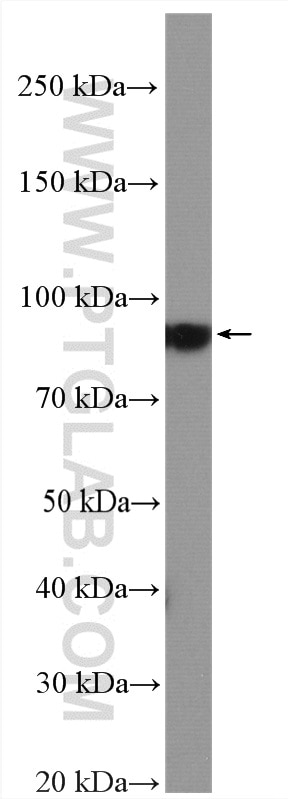Anticorps Polyclonal de lapin anti-KCNQ3
KCNQ3 Polyclonal Antibody for WB, ELISA
Hôte / Isotype
Lapin / IgG
Réactivité testée
Humain, porc et plus (1)
Applications
WB, ELISA
Conjugaison
Non conjugué
N° de cat : 19966-1-AP
Synonymes
Galerie de données de validation
Applications testées
| Résultats positifs en WB | tissu cardiaque de porc, |
Dilution recommandée
| Application | Dilution |
|---|---|
| Western Blot (WB) | WB : 1:500-1:1000 |
| It is recommended that this reagent should be titrated in each testing system to obtain optimal results. | |
| Sample-dependent, check data in validation data gallery | |
Applications publiées
| WB | See 2 publications below |
Informations sur le produit
19966-1-AP cible KCNQ3 dans les applications de WB, ELISA et montre une réactivité avec des échantillons Humain, porc
| Réactivité | Humain, porc |
| Réactivité citée | souris |
| Hôte / Isotype | Lapin / IgG |
| Clonalité | Polyclonal |
| Type | Anticorps |
| Immunogène | Peptide |
| Nom complet | potassium voltage-gated channel, KQT-like subfamily, member 3 |
| Masse moléculaire calculée | 97 kDa |
| Poids moléculaire observé | 90 kDa |
| Numéro d’acquisition GenBank | NM_004519 |
| Symbole du gène | KCNQ3 |
| Identification du gène (NCBI) | 3786 |
| Conjugaison | Non conjugué |
| Forme | Liquide |
| Méthode de purification | Purification par affinité contre l'antigène |
| Tampon de stockage | PBS avec azoture de sodium à 0,02 % et glycérol à 50 % pH 7,3 |
| Conditions de stockage | Stocker à -20°C. Stable pendant un an après l'expédition. L'aliquotage n'est pas nécessaire pour le stockage à -20oC Les 20ul contiennent 0,1% de BSA. |
Informations générales
KCNQ3, also named as BFNC2, EBN2 and KV7.3, belongs to the potassium channel family and KQT subfamily. KCNQ3 is probably important in the regulation of neuronal excitability. Associates with KCNQ2 or KCNQ5, KCNQ3 forms a potassium channel with essentially identical properties to the channel underlying the native M-current, a slowly activating and deactivating potassium conductance which plays a critical role in determining the subthreshold electrical excitability of neurons as well as the responsiveness to synaptic inputs. Defects in KCNQ3 are the cause of benign neonatal epilepsy type 2 (EBN2). The antibody recognizes the C-term of KCNQ3.
Protocole
| Product Specific Protocols | |
|---|---|
| WB protocol for KCNQ3 antibody 19966-1-AP | Download protocol |
| Standard Protocols | |
|---|---|
| Click here to view our Standard Protocols |
Publications
| Species | Application | Title |
|---|---|---|
Hippocampus Impacted spike frequency adaptation associated with reduction of KCNQ2/3 exacerbates seizure activity in temporal lobe epilepsy | ||
Genes (Basel) Differential Dorsolateral Prefrontal Cortex Proteomic Profiles of Suicide Victims with Mood Disorders. |


